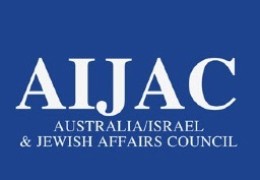MEDIA RELEASES
AIJAC statement on Foreign Minister Bishop’s forthcoming visit to Iran
April 9, 2015

Statement
Knowing Foreign Minister Julie Bishop’s principled views, AIJAC is hopeful that, on her controversial visit to Iran, she will express her disapproval in the strongest terms possible of the Iranian leadership’s continued calls for the destruction of Israel, its promotion of terrorism and its fanatical propagation of antisemitism.
In the midst of the nuclear negotiations which concluded last week, Mohammad Reza Naqdi, the Commander of the Basij militia of Iran’s Revolutionary Guards, declared that erasing Israel from the map is non-negotiable, while in March, her host, supposedly moderate Foreign Minister Javad Zarif, said Israel “should be annihilated”. We therefore hope that our Foreign Minister will make clear the complete unacceptability of this attitude and will stress the importance of the Iranian leadership acknowledging Israel’s right to exist as part of any final agreement.
It is also imperative that the Iranian leaders hear from Ms Bishop that the West is willing and able to defend its values and interests, and that no nuclear weaponisation by Iran is acceptable under any circumstances.
Well aware that many crucial details still need to be settled before June 30 to create a better, more reasonable deal, we are hopeful she will explain to the Iranians the importance of tightening up verification and providing remedies for inspection inadequacies and of linking sanctions relief to improved Iranian behaviour with agreed, workable enforcement mechanisms for violations.
Important US allies, including Australia, should use whatever influence we have to ensure that any ultimate deal is effective in limiting Iran’s nuclear aspirations and doesn’t prematurely confer unwarranted legitimacy on an unreformed, aggressive, expansionist rival.
As our Foreign Minister well understands, the implications of Iran’s nuclear ambitions are so far-reaching, and the consequences of a bad, ineffective deal so dire – reviving the economy and strength of a radical Islamist regime and making it even more threatening to its neighbours behind its nuclear shield – that it’s crucial for our own national interest that any deal signed deprives Teheran of any path to a nuclear capability or bomb.
Additional comment:
We are deeply concerned that this unsigned framework agreement will leave Iran a nuclear threshold state, with its nuclear infrastructure, including its research, missile program and military facilities, left intact. There are self-evident weaknesses in the critical verification and inspection provisions. These include the lack of clarity on how violations will be dealt with and on which sanctions would be lifted, and when and how they could be re-imposed. These critical details need to be resolved satisfactorily and then agreed to by Iran by June 30. While any ultimate deal must ensure that the terror-supporting, expansionist, fundamentalist regime in Teheran is prevented from acquiring nuclear weapons capability, this framework risks conceding Iran precisely that nuclear status and the ability to assert further regional dominance.
Tags: Australasia





